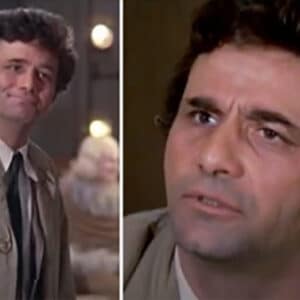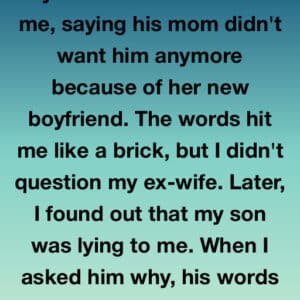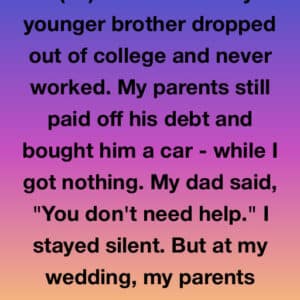My fiancé vanished one week before our wedding. No fight, no warning, no explanation. One day we were finalizing seating charts, and the next he was simply gone. I spent days calling hospitals, friends, his family—anyone who might know something. Everyone had the same answer: no clue.
By the time our honeymoon flights rolled around, I was hollowed out. Angry. Embarrassed. Heartbroken. On a whim—or desperation—I boarded the plane alone. Paris wasn’t the place I imagined crying into airport coffee, but there I was.
When I walked into the hotel lobby, jet-lagged and numb, I froze.
Theo was standing there.
He looked thinner, disheveled, as if sleep had been optional for too long. And when his eyes found mine, he broke. Right there in the lobby, he started crying—big, messy sobs that made the receptionist look away politely.
“I’m so sorry,” he choked out. “I didn’t know how else to protect you.”
The words knocked the air out of me. “Protect me from what?” I snapped. “From commitment? From our wedding?”
He shook his head. “No. Not that. There’s something I never told you.”
I dragged him away from staring eyes, behind a giant potted palm tree. My chest was tight. “Then tell me now. You owe me that much.”
Theo looked like a man unraveling thread by thread. “When I was nineteen… I got mixed up with the wrong people. I made deliveries for them. I was basically a drug mule.” He swallowed hard. “I got caught. I turned state’s witness. They put me in witness protection for a while.”
I blinked so hard I felt dizzy. “Witness protection? Seriously?”
“I left the program years ago. I changed my name legally. I thought I was free.” He looked down. “But last week… someone found me. Someone from back then. They sent me a photo of you leaving work with a message: ‘Nice fiancée. Be a shame if something happened.’ I panicked. I didn’t know what to do except disappear.”
My stomach knotted. I hated that part of me felt sympathy—because I still loved him, even in the middle of the mess.
“So instead of telling me,” I said quietly, “you left.”
“I know.” He covered his face. “I was terrified. Not of them—of losing you.”
I didn’t know how to process any of it. “Are we in danger?”
“I don’t think so. I’ve been careful. But you deserved the truth.”
We moved to the hotel café and sat there in silence, two espressos untouched between us. Theo talked. I listened. But I didn’t forgive—not yet. That night I took a separate room.
Over the next few days, we kept bumping into each other—at breakfast, in a quiet bookstore, in a tiny art gallery where he stared at a Monet like it might tell him how to fix his life. We started talking again, inch by inch, like people learning a new language.
On the fifth day, we were walking along the Seine when I noticed a man behind us. Always the same distance. Always watching.
“Do you see him?” I whispered.
Theo glanced back, and his face drained of color. “That’s him.”
My pulse thrashed. “What do we do?”
“We run.”
We ducked into a shop, slipped out the back, and sprinted down side streets until my lungs burned. Back at the hotel, Theo called someone—an old government contact.
After an hour, he hung up, exhausted. “They’ve been tracking him for weeks. He’s already under surveillance. They’re building a case.”
My knees felt weak. “So we’re safe?”
“For now.” He hesitated. “But I don’t know if we’ll ever be normal.”
I looked at him—really looked. “Normal is overrated. I don’t want perfect. I want honesty.”
His eyes filled again. “You still want to try?”
“I want to see if we can.”
The next morning, he left a note under my door: Meet me at Pont Alexandre III. Noon.
I almost didn’t go. But curiosity, stubbornness, and something softer won.
He was standing there with a notebook in his hands.
“I wrote everything,” he said. “My past. What happened. How I felt. If you take it, I’ll walk away and let you decide.”
He handed it to me and left.
I sat on a bench and read the entire thing. It wasn’t just a confession. It was a life story, a love letter, a man’s shame laid bare. He wrote about growing up without believing he deserved anything good. How meeting me scared him because it felt like a second chance he wasn’t worthy of. How guilt had been sitting in his bones for years.
I cried. I laughed. I cursed his decisions. And then I cried again.
When I found him in the hotel courtyard later, I said, “This doesn’t fix everything. But I believe you love me.”
“I do,” he whispered.
“And I believe we can start over.”
For the rest of the trip, we weren’t fiancés—we were two people cautiously rebuilding a bridge.
Back home, it wasn’t smooth. My mother refused to meet his eyes for weeks. Friends whispered behind my back. But we worked through it. Therapy, brutal honesty, ugly arguments, deeper forgiveness.
Six months later, we married quietly in my aunt’s backyard—twenty people, a borrowed dress, too many pies, and vows that felt like truth instead of fairy tales.
Three years have passed now. We live in a little house near the woods. Theo teaches high school mechanics. I work from home. We have a cat named August and a garden that—despite our best efforts—mostly grows weeds.
Sometimes I watch him brewing coffee in the morning, sunlight catching the scars he tried to hide from me, and I think: How did we survive that storm?
But we did.
Here’s what I learned:
Love isn’t always glamorous. It’s messy. It’s painful. It’s terrifying. Sometimes it vanishes before the wedding and meets you again in a Paris lobby with shaking hands and a broken heart.
And sometimes, if it’s real, it finds its way back.
If this story spoke to you, feel free to like, comment, or share it—someone out there might need the reminder that endings aren’t always endings. Sometimes they’re beginnings in disguise.





